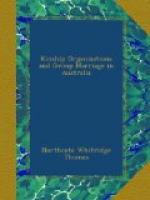We may now examine the relation of matriliny to the seat of authority in the family. Questions of potestas naturally range themselves under more than one head. We have (1) the relation of the husband (a) to the wife and (b) to the children; (2) the relation of the mother to the children, and closely connected with this the influence of the mother’s brother; finally (3) we have the position of the widow, a matter indeed more intimately connected with inheritance from a legal point of view but in Australia more closely connected with potestas than in countries where slavery is a recognised institution.
Small as is our information on Australian jurisprudence, it is certain that the husband enjoys practically unrestricted rights over the person of his wife, pirrauru and similar customs apart. He may at will lend her or hire her out to strangers; he may punish her infidelity, disobedience or awkwardness by chastisement, not stopping short of the infliction of spear or club wounds; he may even, according to Roth[16], go so far as to kill her and yet get off scot free, his only duty in such a case being to provide a sister for the brothers of his dead wife to kill in retaliation.
This custom suggests that the kin to which the woman belongs claim a certain property in her even after she is married, and this partial proprietorship naturally implies a slight protecting influence; for it would clearly not be in every case easy for the homicidal male to find a sister ready to go out and be killed as a set-off to his murdered wife. We should not, it is true, overlook the fact that the customs of the Pitta-Pitta differ from those of many of the Australian tribes, in that exchange of sisters is not practised. Otherwise it would be tempting to argue that this proprietorship in the women of their kin may go back to the time of Mr Lang’s connubial groups and help to explain the reckoning of descent through females. For clearly, if a woman still belongs in a sense to the group she has left, so may her children belong to the same group, inasmuch as their relationship to her is, to us at any rate, unmistakeable. If any evidence could be produced for the widespread existence of the custom (found in various parts of the globe, though not, up to the present, in Australia), according to which the widow and her children remove to her own district, some probability would be imparted to this hypothesis.
The ordinary rule as regards punishment inflicted by the husband on the wife seems to be that he may go any length short of doing her a mortal injury, without being liable to be called to account. The punishment of death however may only be inflicted for adultery and certain specified offences without incurring a blood-feud with the woman’s relatives.




